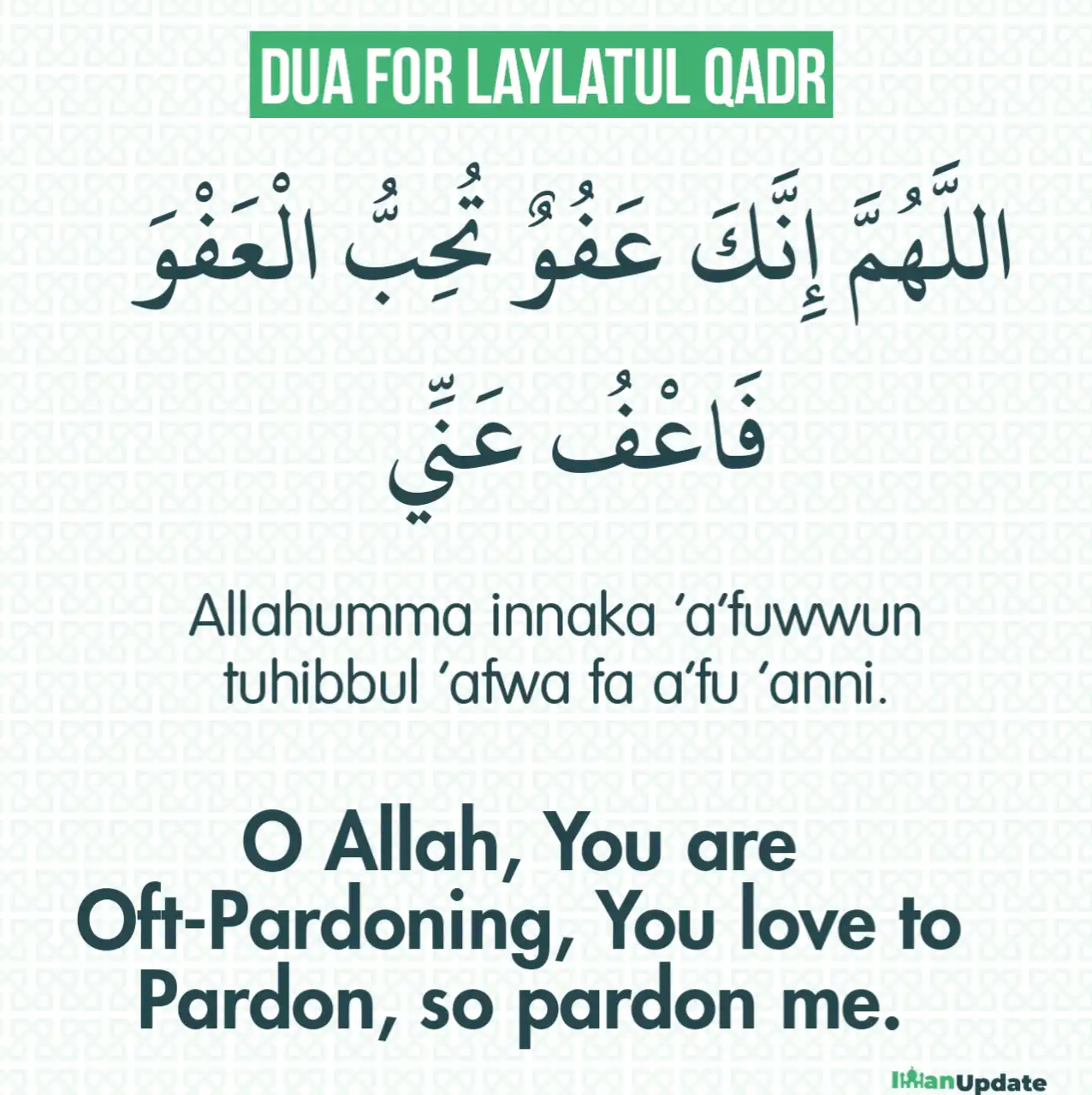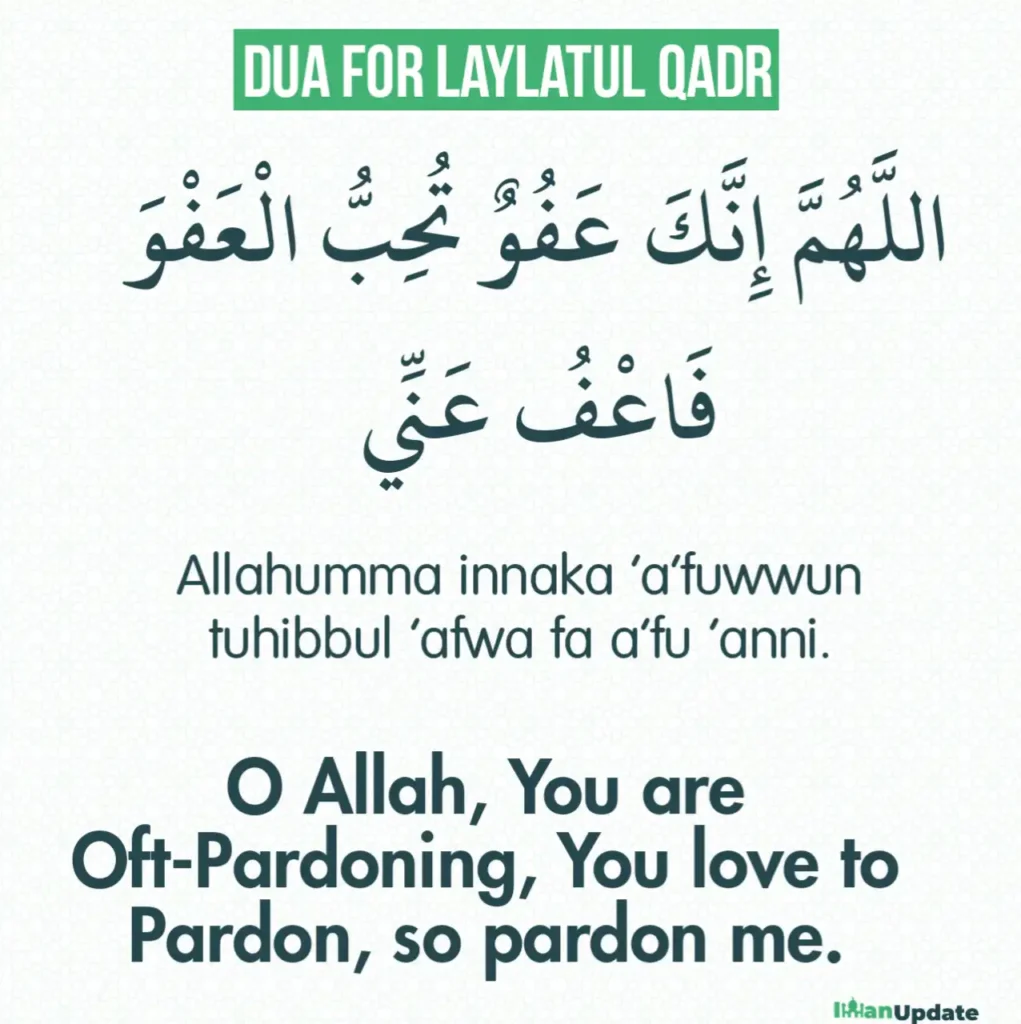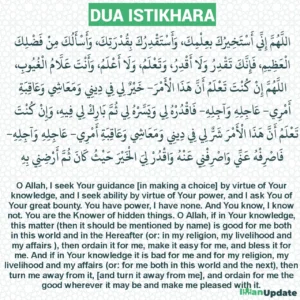Dua For Laylatul Qadr Meaning, Arabic Text and Hadith

Laylatul Qadr, or the Night of Power, is a very special night in Islam. It happens during the last ten days of Ramadan. Muslims use this time to think deeply about their faith, pray, and ask for blessings and forgiveness.
On this special night, Muslims say a special prayer called the “dua for Laylatul Qadr”. This prayer comes from the heart and asks Allah to be merciful and forgiving.
Laylatul Qadr is a time when Muslims try to get closer to Allah and ask for His blessings. It’s a night of deep spiritual connection and prayer.
Dua For Laylatul Qadr in Arabic
اللَّهُمَّ إِنَّكَ عَفُوٌ تُحِبُّ الْعَفْوَ فَاعْفُ عَنِّي
Transliteration
The laylatul qadr dua is transliterated as Allahumma innaka ‘a’fuwwun tuhibbul ‘afwa fa a‘fu ‘anni.
Dua For Laylatul Qadr Meaning in English
The dua of laylatul qadr means O Allah, You are Oft-Pardoning, You love to Pardon, so pardon me.
The Power of This Special Dua
This special prayer is very meaningful and brings many benefits with lasting effects. It’s especially suitable for Laylatul Qadr, a night when Allah plans everything for the coming year.
If someone receives Allah’s blessings and forgiveness on this night, they have truly succeeded and gained the greatest reward.
Receiving well-being and prosperity in this life and the next is the ultimate gift, and there’s nothing more valuable than that.
READ ALSO: Dua Before Entering Toilet and Leaving Bathroom Meaning & Arabic
Dua For Laylatul Qadr Hadith
Here is the authentic and full Hadith along with reference.
Aishah RA reported: I said, “O Messenger of Allah, if I know which night is the Night of Decree, what should I say during it?” The Messenger of Allah (ﷺ) said, “Say: Allahumma innaka ‘a’fuwwun tuhibbul ‘afwa fa a‘fu ‘anni.
[Narrated by at-Tirmidhi 3513, an-Nasa’i in Amal al-Yawm wa Layla, Ibn Majah 3850 and Musnad Ahmed, 42/236, no. 25384]
Note: Apart from the virtuous night, the Dua can be said anytime outside of Ramadan as well.
Shaykh Al-Albani’s Commentary
Shaykh Al-Albani noted that in one version of a hadith (a saying of the Prophet Muhammad) in Sunan Tirmidhi, the word “generously” is added after “pardon”. However, this extra word is not found in other reliable sources.
Aishah, the Prophet’s wife, said: “If I knew which night was Laylatul-Qadr, I would only ask Allah for well-being on that night.” (Authentic narration)
So, based on this, one can say:
Laylatul Qadr Dua in Arabic
اللَّهُمَّ إِنِّي أَسْأَلُكَ الْعَافِيَةَ فِي الدُّنْيَا وَالْآخِرَةِ
Transliteration
Allahumma inni as’alukal-‛afiyata fid-dunya wal-akhirah.
Laylatul Qadr Dua in English
O Allah, I ask You for well-being in this life and the next.
Why Say This Dua on Laylatul Qadr?
Laylatul Qadr is a special night when prayers are answered. So, increase your prayers on this blessed night. Aishah, the Prophet’s wife, asked him what to say on this night. He taught her a prayer that’s perfect for this night.
Scholars say there are two main reasons to say this prayer on Laylatul Qadr:
- We should pray for forgiveness because we can’t do enough good deeds to deserve Allah’s rewards. We should say, “O Allah, You are forgiving and love to forgive, so pardon me.”
- On Laylatul Qadr, Allah decides what will happen in the coming year. So, we should ask for pardon and well-being on this night, so we can have a good year.
Remember, Allah is forgiving and generous, and He loves to pardon. So, say this prayer often, especially on Laylatul Qadr.

Further Benefits
The Wisdom Behind Asking For Pardon on This Night
Ibn Rajab (رحمه الله) said: “Asking [Allah] for complete forgiveness on the Great Night of Decrees, after working hard at doing good deeds on it and on the [last] ten nights, has only been prescribed because those who know [about Allah properly] work hard at doing [good] deeds, and after that, they [still] don’t see for themselves any good deeds, nor a [good level or] state, nor [good, rewardable] speech.
So they go back to asking for complete forgiveness, like one does who sins and falls short of what’s upon him.”[Lataʾif Al-Maʿarif, p. 242]
Ibn Rajab also said: “Al-‘Afuww (The One Who pardons greatly) is from The Names of Allah The Most High; and He overlooks the wrongdoings of His servants, He is The One Who erases their trace from them.
He Loves to pardon; and so He Loves to pardon His servants, He likewise Loves from His servants that they should pardon each other, so if they pardon each other; He conducts His pardon with them; and His Pardon is more beloved to Him than His Punishment.”[Lataʾif Al-Maʿarif, p. 279]
Yahya bin Mu’adh (رحمه الله) said: “The acquainted one is not the one whose outmost objective in hope isn’t to obtain pardon from Allah.”[Lataʾif Al-Maʿarif, p. 280]
Ibn al-Qayyim (رحمه الله) said: “The Prophet (ﷺ) said to the most obedient of the women of the Ummah, the most virtuous and the best of them, as-Siddeeqah bint as-Siddeeq when she said to the Messenger of Allah, if I come across Laylatul Qadr, what should I supplicate with, he replied:
‘Say (the above dua) Allah Subhanahu whilst His love for pardoning and repentance, created His creation upon characteristics, forms and circumstances which necessitate them repenting to Allah, them seeking forgiveness, their requesting Allah’s pardon and His forgiveness.”
[Shifa al-Aleel fee Mas’ail al-Qada wal Qadr wal Hikmah wa Ta’aleel 1/116]
Ibn al-Qayyim (رحمه الله) also said: “Allah Subhanahu loves His Sifat, as the Prophet (ﷺ) said: ‘O Allah, indeed You pardon and You love pardoning so pardon me.’
He also said: ‘Indeed Allah is Beautiful and loves beauty’, ‘indeed Allah is Pure and loves purity’, ‘indeed Allah is Witr and loves Witr’; it is narrated that ‘indeed I am All-knowing, I love everyone who has knowledge’. If Allah loves His Attributes which are established by Himself so how about His love for His Own Self.”
[Saawaiq al-Mursalah fee Radd ala al-Jahmeeyah wal Mu’attalah 4/1458]






